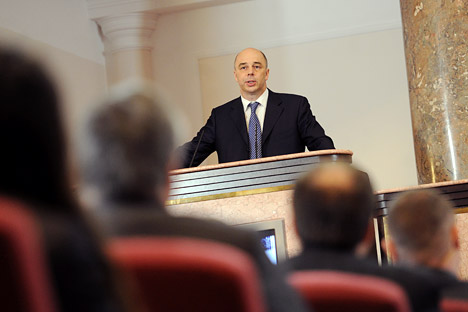
Russia's Finance Minister Anton Siluanov has put forward some proposals that suggest it is positioning itself as an independent player in the Russian political arena. Source: ITAR-TASS
After the resignation of tough-minded Finance Minister Alexei Kudrin, many analysts thought that the Russian Ministry of Finance would become a docile agency. Kudrin’s successor, Anton Siluanov, was seen as a puppet under which the ministry would be totally powerless and lacking initiative.
Almost a year has passed since Kudrin left office, and these forecasts have been proven wrong. Far from yielding ground, the Ministry of Finance has put forward some proposals that suggest it is positioning itself as an independent player in the Russian political arena.
Finance Ministry sees no signs of capital outflow from Russia
“From the outside, it may appear that the Russian executive branch is a monolithic structure,” said political analyst Mikhail Romantsov.
“Outside observers tend to think that all ideas and reforms are conceived within the presidential administration and then ‘handed down.’ But this is far from being the case. The Russian government has many structures, each of which lobbies its own interests and promotes its own agendas. The Ministry of Finance is a striking example.”
Perhaps the most interesting proposal that has recently emerged from Siluanov’s agency is the one that suggests creating a mega-regulator by placing the Federal Financial Markets Service under the wing of the Central Bank.
Sources at the Ministry of Finance say that the main aim of the merger is to minimize the differences between various structures and consolidate document processing in a single network.
Critics of the measure argue that the Central Bank’s takeover of the Federal Financial Markets Service (FFMS) will give rise to the new structure being vested both with legislative and executive functions, which may be bad for market freedom.
But the Ministry of Finance reassures its critics that the establishment of a separate agency to fight insider trading and protect the interests of consumers and the rights of minority shareholders will counter any negative consequences the move may bring.
Another characteristic of the Ministry of Finance that has remained intact since the Kudrin administration is its tough stance on what it considers to be non-targeted spending.
As Anton Siluanov said in early September, “Some Russian regions pursue an ill-advised and irresponsible financial policy which has landed them in debt. The governors who put the regional budget into a debt pit should be made more accountable.”
He was referring, above all, to the 20 regions where the debt exceeds half of overall revenue. The heads of local administrations took issue with the idea, not wanting the federal center to poke its nose in their budgets without contributing any other useful ideas.
Responding to the criticism, the Ministry of Finance advised the regions to, firstly, obtain loans not only from the state but also from commercial banks and, also, to think about cutting the number of civil servants.
Concerning the matter of downsizing, optimizing the work of government bodies is also on the agenda. It has been suggested that the number of officials be cut by a quarter and that the salaries of those who remain be raised. The cuts would involve fixed-term contracts, which effectively amount to outsourcing.
Vladimir Nazarov, an expert with the Gaidar Institute for Economic Policy, claims that this would be a very useful step for Russia to take.
“At present it is practically impossible to sack a government official: he is under an indefinite contract and, even if he is clearly not fit for purpose, he keeps his job. Under the new system of fixed-term contracts, if you are not doing a proper job, your contract will not be extended.”
However, the Ministry of Finance believes that it is not just the civil servants who are derelict in their duties, but parliamentary deputies as well.
Recent rumors had it that the ministry had prohibited lawmakers from interfering in budget matters. The rumors managed to make a big stir among deputies before they were finally denied.
International analyst Yevgeny Morzhov believes that the Ministry of Finance’s idea suggests that the global technocratic trend is spreading to Russia.
“People in developed countries, especially in Europe, are fed up with politicians,” Morzhov said.
“Politicians have a poor grasp on matters, make big promises and stage pompous electoral shows. Naturally, nothing useful comes out of it. But governments consisting of experts – and not politicians – can really help a country when times become hard.”
Some believe that the most recent Russian government was deliberately formed from technocrats who would balance off the professional politicians.
“Of course the experts’ initiatives are less impressive and fanciful than the proposals coming from the deputies,” Mikhail Romantsov said.
“This is why they have not yet gained favor with the broad masses. But the simple truth is sinking in to the Russian population: ‘all that glitters is not gold.’ One should assess efficiency not on the basis of ringing statements but on specific results. And the Ministry of Finance’s results are among the best.”
All rights reserved by Rossiyskaya Gazeta.
Subscribe
to our newsletter!
Get the week's best stories straight to your inbox